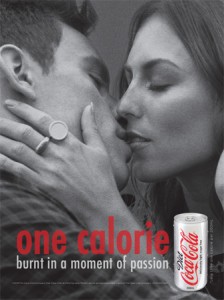diet coke’s new ad campaign – misogyny in a can
The world of advertising is a battleground for women. We are told to ‘Be a Bunny’ by Bras ‘n Things; cosmetic giant Maybelline’s slogan ‘Maybe it’s Maybelline’ suggests that beauty can be bought; last year, ads on the back of buses encouraged us to ‘Keep Australia Beautiful’ by using diet bars to look like the bikini-clad woman shown in the ad.
Unilever’s Lynx brand is the epitome of using women’s bodies to sell a product that has nothing to do with the conventionally beautiful women they use in their advertising campaigns. When engaging in discussions about products we take exception to, we are often told that if we don’t like it, we don’t have to buy it. This is fortunate in the case of Lynx as not a lot of women will be keen on wearing a men’s deodorant, however we are likely to use a woman’s deodorant such as Rexona, which is also owned by Unilever. We are also likely to use products from their other brands, such as Dove skincare, Streets ice cream, or Raguletto pasta sauce. We may not even be aware they are owned by the same company, but we are still pouring money into the company that manufactures misogyny with their Lynx brand.
The deluge of images of sexualised women, of bums and breasts disembodied from the person, of pouty celebrities keeps us apologetic for how we look and keeps us buying products. The more fortunate among us (and if you’re reading Lip, you’re one of them!), who have encountered messages telling us that advertisements are carefully engineered to coerce women to vainly try to buy beauty, are able to critically evaluate media messages and try to resist their pull. We can even consciously avoid the product being advertised in ways we take issue with.
What has troubled me recently is the new Diet Coke campaign, ‘One Calorie Burnt in a Moment’. Featuring attractive women participating in activities like running in heels or about to have a sexually charged kiss, the campaign shows ways in which you can burn the calorie you gain from drinking Diet Coke. Diet Coke is a product marketed towards women, as is the provocative ad campaign. A campaign which is directed towards women should not have to subscribe to the male gaze, but perhaps that is the point. Perhaps it is meant to make women feel guilty for not being as thin and perfectly proportioned as the women in the advertisements, thus coercing us to buy Diet Coke to avoid the pesky extra calories to be had from a full-sugar drink. But that’s not all you have to feel guilty about- you then have to concern yourself with how to burn off the single calorie you have consumed. God forbid you put on a fraction of a gram of fat.
Some of the most powerful choices we can make are as consumers. Not buying a product, and encouraging your friends to do the same, means less money is going to the company you take exception with. Organised boycotts are even more effective. But the problem is, sometimes you want to have that product that you’re boycotting, or you want to buy a different product that company makes. When you’ve been consuming a product for years, it’s hard to let go. I don’t want to have to give up Diet Coke, which has been my beverage of choice for years, despite being uneasy about their latest campaign. I would love to buy cute lingerie from Bras ‘n Things, but can’t bring myself to inadvertently support the Playboy empire. I would like to continue using Unilever products, from pasta sauce to moisturiser, because they are products I have always used and liked, even though Lynx is consistently offensive to women.
Sticking to your principles when making consumer choices is limiting, and you often cannot get a similar product to what you want. This identifies huge gaps in the market for companies which don’t use women’s bodies as a commodity. While it’s easy to get fair-trade chocolate that tastes just like the chocolate we’re used to, or sweatshop-free clothing that is just as fashionable as chainstore garments, it is all but impossible to find woman-friendly products that the mainstream consumer would be happy with. Until that gap is filled, those of us who want to drink Coke or eat a Cornetto ice-cream (owned by Unilever) will either have to compromise their principles, or go without.
By Natasha Abrahams



It’s so upsetting to see advertising play on people’s insecurities like this. It’s basically equating calorie counting with desirability! Glad you took the time to write something about it.
Its still better than the Pepsi Max adds that were on for a while. Which I think can be best summerised by Victoria Coren ‘Pepsi Max, for the clever rapist’.
Having said that Diet Coke spent years having adds where there were guys with bulging muscles being ogled by women as they did their daily work.